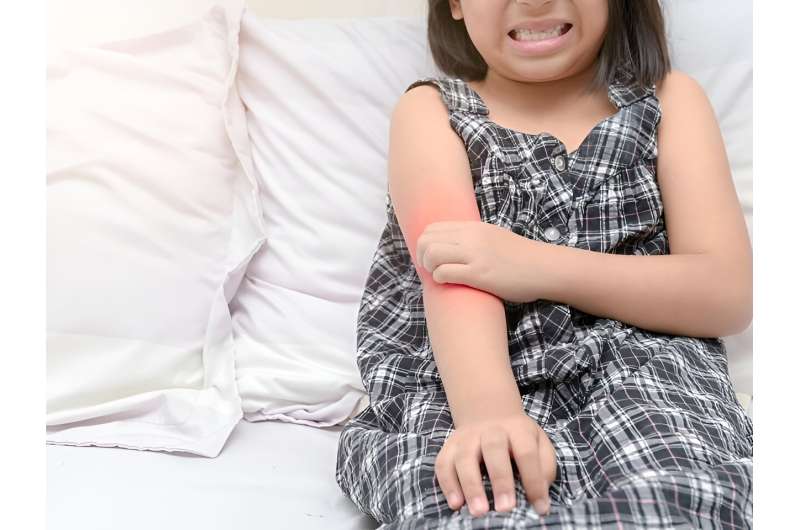This article has been reviewed according to Science X's editorial process and policies. Editors have highlighted the following attributes while ensuring the content's credibility:
fact-checked
peer-reviewed publication
reputable news agency
proofread
Kids with eczema may need further allergy tests

Some children who have a common form of eczema should also be tested for allergic reactions because they may have a second allergic-type eczema, a new study suggests.
While atopic dermatitis is common and usually develops by age 5, allergic contact dermatitis has similar symptoms and can be triggered by a range of substances. In general, eczema is a group of medical conditions causing inflamed, irritated and itchy skin.
In the study, children with atopic dermatitis were more likely to test positive for allergies in patch testing. The findings were published Sept. 26 in the Journal of the American Academy of Dermatology.
"When a dermatologist sees a child who looks like they have eczema, we usually think that it's atopic dermatitis because nearly 1 in 5 children develop it," said senior study author Dr. JiaDe (Jeff) Yu, an assistant professor of adult and pediatric dermatology at Massachusetts General Hospital.
"Sometimes these kids could have allergic contact dermatitis, but the only way to tell is through patch testing, which is designed to identify substances that may be irritating your skin," he said in a journal news release.
Patient Liz Schoeben knows the importance of testing for this allergic-type eczema.
Schoeben has had atopic dermatitis since she was 9 and now knows she also has the allergic contact dermatitis.
"I remember having it in elementary school off and on," the mother of three said in the release. "Years later when I was 47, it became much more severe and spread to my legs and eventually to my face."
Soon, Schoeben learned through patch testing that in addition to having atopic dermatitis she was allergic to six different substances, including several that are commonly found in skin care products. These were causing her allergic contact dermatitis.
The allergies developed over time after repeated exposure, so Schoeben had become increasingly sensitive to them.
"It turns out that most of the things that I'm allergic to are very common ingredients in a lot of products," Schoeben said. "I'm allergic to a type of formaldehyde that's in a lot of skin care products and shampoos. I'm also allergic to beeswax. It was frustrating because I had been using these products for years without realizing they were the cause of my allergic reactions."
Common causes of allergic reactions include poison ivy, poison oak and poison sumac, but also rubber, dyes, cosmetics, preservatives, fragrances and metals such as nickel.
The most effective way to treat allergic contact dermatitis is by identifying and avoiding substances that cause the allergic reaction.
For atopic dermatitis, treatment options include steroids that can be applied to the skin and phototherapy, which uses ultraviolet light to reduce inflammation and ease itch. Other options are medications called biologics and JAK inhibitors.
Lifestyle changes can also relieve eczema symptoms, Yu said. Choosing fragrance-free products can help limit eczema flares.
People with eczema should test new skin care products by first applying them to a quarter-sized patch of skin on the inside of the arm every day for four weeks before using the product more widely.
It's important for people with signs of eczema to see a dermatologist.
"Patients can have atopic dermatitis and allergic contact dermatitis at the same time, and it all looks like the same thing," Yu said.
"I imagine it like layers of a cake," he continued. "Maybe the first layer is atopic dermatitis, and then the second layer is allergic contact dermatitis. In these cases, the overall eczema may look very severe, but once you remove the allergic component, the eczema seems much more manageable."
More information: Hadley Johnson et al, Prevalence of allergic contact dermatitis in children with and without atopic dermatitis: A multicenter retrospective case-control study, Journal of the American Academy of Dermatology (2023). DOI: 10.1016/j.jaad.2023.06.048
Copyright © 2023 HealthDay. All rights reserved.

















